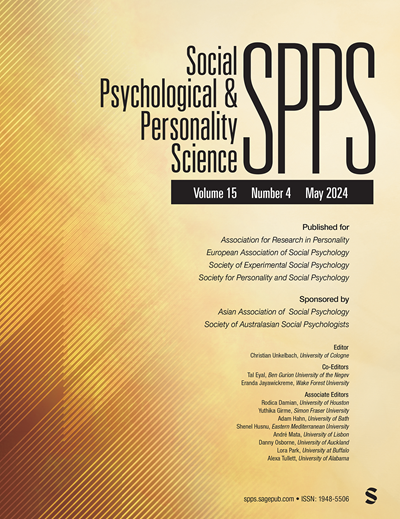"阴谋论并不意味着他们不会对付你":区分似是而非的阴谋论判断的相关因素
IF 3.3
2区 心理学
Q1 PSYCHOLOGY, SOCIAL
引用次数: 0
摘要
尽管阴谋论作为社会事件的解释表现出不同程度的可信性,但它们通常被认为在认识论上存在问题。由于对可信度的规范性描述对其定义并不重要,我们试图研究对(不)可信的阴谋论的判断是否有不同的心理基础。在两项预先登记的研究中(N = 563),虚构的阴谋论的可信度是通过预先测试评分(研究 1)或在信念更新范式中通过实验操纵支持信息(研究 2)来操作的。虽然阴谋论心态中的一般怀疑心态与一致认为可信的阴谋论中更大的可信度有关,但这一点在不可信的阴谋论中明显更强。认知变量只与被认为不可信的阴谋论的可信度呈负相关。结果表明,一般的多疑观点,加上有限的认知技能和理性思维倾向,与对阴谋论可信度判断的偏差和对不证实阴谋论的信息的轻视有关。本文章由计算机程序翻译,如有差异,请以英文原文为准。
“Just Because It’s a Conspiracy Theory Doesn’t Mean They’re Not Out to Get You”: Differentiating the Correlates of Judgments of Plausible Versus Implausible Conspiracy Theories
Although conspiracy theories exhibit varying degrees of plausibility as explanations for societal events, they are typically considered epistemically problematic. Since normative ascriptions of plausibility are not essential to their definition, we sought to examine whether judgments of (im)plausible conspiracy theories have different psychological underpinnings. In two preregistered studies ( N = 563), the plausibility of fictitious conspiracy theories was operationalized by pretest ratings (Study 1) or by experimentally manipulating supporting information in a belief updating paradigm (Study 2). While the general suspicious mind-set of conspiracy mentality was associated with perceiving greater plausibility in consensually plausible conspiracy theories, this was markedly stronger for implausible conspiracy theories. Cognitive variables were only negatively associated with attributing greater plausibility to conspiracy theories deemed implausible. The results suggest that a general suspicious perspective, along with limited cognitive skills and rational thinking dispositions, is related to biased plausibility judgments of conspiracy theories and the underweighting of information disconfirming them.
求助全文
通过发布文献求助,成功后即可免费获取论文全文。
去求助
来源期刊

Social Psychological and Personality Science
PSYCHOLOGY, SOCIAL-
CiteScore
12.50
自引率
1.80%
发文量
77
期刊介绍:
Social Psychological and Personality Science (SPPS) is a distinctive journal in the fields of social and personality psychology that focuses on publishing brief empirical study reports, typically limited to 5000 words. The journal's mission is to disseminate research that significantly contributes to the advancement of social psychological and personality science. It welcomes submissions that introduce new theories, present empirical data, propose innovative methods, or offer a combination of these elements. SPPS also places a high value on replication studies, giving them serious consideration regardless of whether they confirm or challenge the original findings, with a particular emphasis on replications of studies initially published in SPPS. The journal is committed to a rapid review and publication process, ensuring that research can swiftly enter the scientific discourse and become an integral part of ongoing academic conversations.
 求助内容:
求助内容: 应助结果提醒方式:
应助结果提醒方式:


